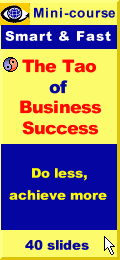|
Success
Defined
 You achieve
success when you meet
a
stretch goal overcoming
problems,
failures, and difficulties by
conscious effort and by application of your capabilities, resources and
methods. You achieve
success when you meet
a
stretch goal overcoming
problems,
failures, and difficulties by
conscious effort and by application of your capabilities, resources and
methods.
 The Wheel of Personal Success
The Wheel of Personal Success
Clarify What You Really Want
To be successful, you must have a clear
compelling
vision of what you want from life.
Your vision performs both a directional and a
motivational function. The purpose of your coherent vision of a
desirable future is to focus you on those things you could do now to bring
that future state about.
Choose Success
Failure
never "happens", it's your choice. If
you believe that failure
is not a choice, you'll never fail. Test new ideas, learn from what works, and
what doesn't, and then apply these lessons to your next
experiment, test or idea. Keep doing this until you get results you are
satisfied with.
Don't give up when things go wrong. Every
costly lesson is going to result in exponentially greater success in the
long term. Seek out the positive in every bad situation and ask, "What can I
learn from this? How can do it again more intelligently?"
The Trap of Fixation on Success
Success is nearly a magical idea for most
people. In his Book The Active Life, Parker Palmer points out that
in the West fixation of people on success discourages them from risk
taking "because it values success over
learning, and it abhors
failure whether we learn from it or not. It always wants to win but win
or lose, it inhibits our learning. If we win, we think we know it all and
have nothing more to learn. If we lose, we feel so defeated that learning is
a hollow consolation... It traps us in a system of praise or blame, credit
or shame, a system that gives primacy to goals and external evaluations,
devalues the gift of self-knowledge, and diminishes our capacity to take
risks that may yield growth," writes Parker Palmer, the author of The
Active Life.
The Tao of Success – Balance Action and
Reflection
Creating success involves creating and a delicate and ongoing balance
between two somewhat opposing forces –
reflection
of where you are now and
action
of pushing toward where you need to go. This balance between reflection and
action is very similar to the balance of
Yin and Yang in the
Tao philosophy.
Stumbling blocks to success include acting too
often without a clear sense of direction or spending too much time
reflecting without creating outcomes. Truly successful people developed the
ability to move effortlessly and quickly from reflection to action and
back again. They know when action is necessary and they take action promptly
(Yang) so that they can make progress, earn
feedback
and move back to analyzing their position (Yin) and acquiring the knowledge
that they need to be able to move back to action.
Apply 80/20 Principle
The
80/20 Rule says that 20% of your activities will account for 80% of your
results, and vice versa.
Progress means moving resources from low-value to high-value uses. Your
ability to choose between the high-value and the low-value activities is the
key determinant of your success in life and business.
Take Action
Success
isn't determined by genetics. It's about persistent, consistent
action.
Having dreams and
passion is not enough. If you wish to
achieve
something, don't let life just "happen" to you.
Set goals and take action. If you wish to live your dreams, act from a
sense of urgency. There is no success without action. Don't wait, attack to
get things done. Ignite and catapult yourself to greater action and
achievement...
More
Face Reality
Facing reality is one of most important rules
in both life and business. Whether in
life or in business, those who are able to
face reality and acknowledge truth are usually successful. Yet, it is
often difficult to face reality and so much easier to avoid the truth as it
may hurt, embarrass, be painful or self-deflating. Yet, facing this truth is
what makes success in both life and business so simple.
Case in Point Getting the
Best out of Students
Benjamin Zander, a celebrated music teacher, a conductor of the Boston
Philharmonic, and the author of the book called The Art of Possibility,
has an effective strategy for getting best out of his students. In
NLP
terms, this strategy is called 'Creating Inevitable Success'.
On the first day of class, Zander tells his first year students that they all
get an A. There is only one condition. Their first assignment is to write a
letter to him – dated on the last day of class – explaining why they deserved
the highest grade.
Zander believes there are several beneficial aspects of this dramatic role
reversal:
-
It is a great confidence builder for his
students.
-
It eliminates the often counterproductive sniping that people frequently
engage in when they think only a few will win.
-
Students invariably knock themselves out for that A because they do more
to earn their own personal A than they would ever do for the traditional
A given by a teacher.
|